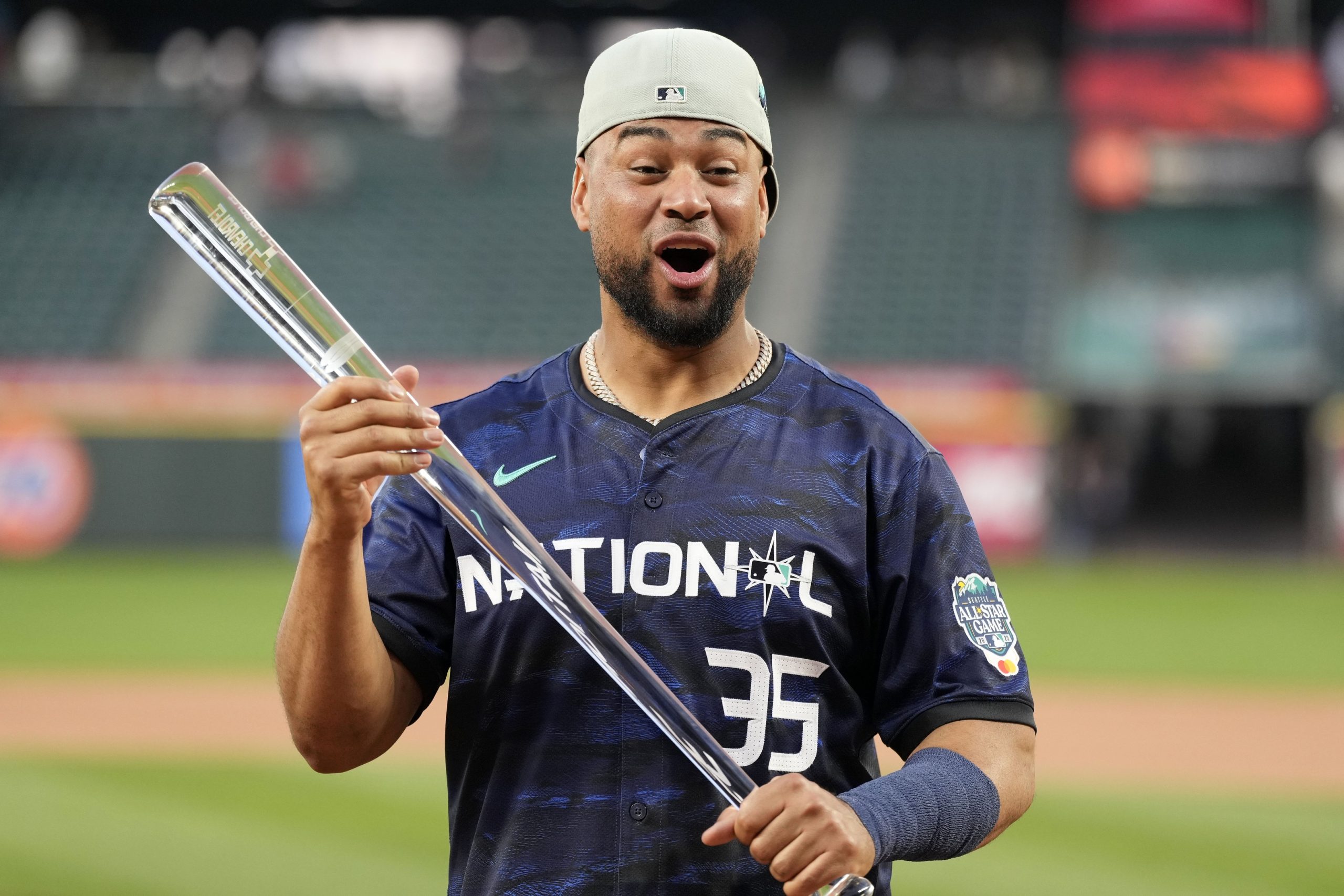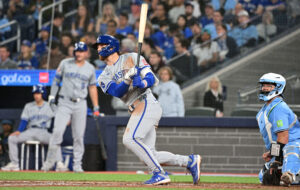Statistically speaking, Elías Díaz should not have been in Seattle as an All-Star. His nod to go to the game represents a major concern with the current format of the midseason festivities. But he made the most of his opportunity. His go-ahead home run gave the National League the lead late. It proved to be the deciding blow and broke the American League’s nine-game win streak. Diaz enshrined himself in baseball history.
Elías Díaz Proves He Is All-Star Worthy With Winning Game’s MVP
“Underserving All-Star”
Díaz is one of many players in MLB history who benefits from the rule that every team gets representation in the All-Star Game. Despite not having the strongest statistics, he got the nod to represent the struggling Colorado Rockies.
In terms of fWAR (0.5), he ranks as the eighth-ranked catcher in the league and fifth in the NL. His 1.6 bWAR ranks as fourth in the MLB and fourth in the NL. In both metrics, there were better players at his position to pick.
Even on his own team, there have better producers. Ryan McMahon has been worth 3.0 WAR with a 108 OPS+ and Ezequiel Tovar has been worth 1.6 WAR. Díaz rode the coattails of a great start to the season and All-Star Game rules to make his way to the Summer Classic.
Scorching Hot Start to Drastic Fall Off
After the first month-plus of play, it seemed like a lock that the Rockies’ backstop was headed to his first career All-Star Game. Month over month, he went from one of the game’s best to quickly becoming a non-factor at the plate.
March/April: 26 games, .321/.380/.464, eight extra-base hits (six HR), 11 RBI, .845 OPS
May: 23 games, .321/.372/.524, nine extra-base hits (four HR), 16 RBI, .896 OPS
June: 24 games, .218/.271/.391, eight extra-base hits (three HR), 18 RBI, .662 OPS
July: 7 games, .174/.174/.174, zero extra-base hits, zero RBI, .348 OPS
The first to go was the contact hitting in June. The power seemed to still be there for the most part, but July was a disaster. Tallying just four total hits, Díaz failed to find any gaps and did not even walk, leading to his slash line featuring the same number three times over. If All-Star rosters were decided after the final game of the first half is played, his 96 OPS+ likely does not make the cut.
All-Star Game MVP
Díaz found a way to forget his June and July struggles. He came up big in the game that should be celebrating the best performances to this point in the season. In the eighth inning, he hit a go-ahead two-run HR to give the NL the lead.
His clutch home run made sure he went home with All-Star Game MVP honors. Becoming the first in Rockies franchise history to do so, as well as being the fuel to prove that his hot start to the season may not have really been a fluke and he can compete with the best in the league.
Now THIS is a souvenir 😍 pic.twitter.com/VI1MLuuPlR
— Colorado Rockies (@Rockies) July 12, 2023
The All-Star Game Problem
Despite his clutch HR and All-Star Game MVP honors, Díaz making the All-Star team over players such as J.T. Realmuto, among others points to many fans’ problems with the game. The rule that every team should be represented does not lend itself to the main point of the All-Star Game itself.
The All-Star Game is meant to represent the best players the league has to offer at that point in the season. But making every team have at least one representative is clearly counterproductive to that point.
Logistically speaking, making sure the host city has at least one player makes sense. Local fans will want to support their favorite players, but outside of that, it begins to lose touch.
Suppose the league is to fully embrace the relative nonsense that is below league-average players being celebrated as the game’s best due to the incompetence that surrounds them on a bad team. In that case, they should also make room for more dedicated “special All-Stars.”
Every year should have a longtime veteran that may be lacking in All-Star nods or a rookie that otherwise would not make it. Even a veteran at the end of their career for one last All-Star curtain call (something that has happened several times in recent memory).
In the grand scheme of player legacy and Hall of Fame status, the sheer number of All-Star teams is blown out of proportion with how getting the nod to go to the game is set up. A more-than-deserving player is snubbed for every below-average representative of a bad team. The MLB should either fully embrace the chaos or get rid of the representative rule outside of the host city.
Main photo credits:
Stephen Brashear-USA TODAY Sports
Players mentioned:
Elias Diaz, Ryan McMahon, Ezequiel Tovar, J.T. Realmuto






